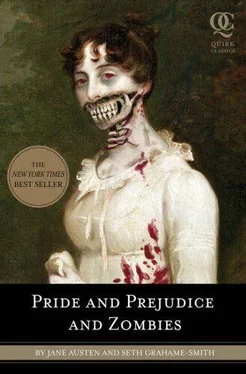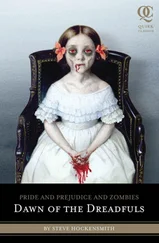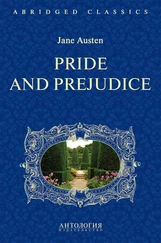“I am certainly the most fortunate creature that ever existed!” cried Jane. “Oh! Lizzy, why am I thus singled from my family, and blessed above them all! If I could but see you as happy! If there were but such another man for you!”
“If you were to give me forty such men, I never could be so happy as you. Till I have your disposition, your goodness, I never can have your happiness. No, no, let me find comfort in cutting down dreadfuls; and, perhaps, if I have very good luck, I may meet with another Mr. Collins in time.”
The situation of affairs in the Longbourn family could not be long a secret. Mrs. Bennet was privileged to whisper it to Mrs. Philips, and she ventured, without any permission, to do the same by all her neighbours in Meryton.
The Bennets were speedily pronounced to be the luckiest family in the world, though only a few weeks before, when Lydia had first run away, they had been generally proved to be marked out for misfortune.
ONE MORNING, about a week after Bingley’s engagement with Jane had been formed, as he and the females of the family were sitting together in the dining-room, their attention was suddenly drawn to the window, by the sound of a carriage; and they perceived a chaise and four driving up the lawn. The horses were post; and neither the carriage, nor the livery of the servant who preceded it, were familiar to them. As it was certain, however, that somebody was coming, Bingley instantly prevailed on Jane to avoid the confinement of such an intrusion, and walk away with him into the shrubbery, where she had promised to instruct him in buck wrestling. They both set off, and the conjectures of the remaining three continued, though with little satisfaction, till the door was thrown open and their visitor entered, accompanied by a pair of ninjas.
It was Lady Catherine de Bourgh.
They were of course all intending to be surprised; but their astonishment was beyond their expectation.
She entered the room with an air more than usually ungracious, made no other reply to Elizabeth’s salutation than a slight inclination of the head, dismissed her guard, and sat down without saying a word. Elizabeth had mentioned her name to her mother on her ladyship’s entrance, though no request of introduction had been made.
Mrs. Bennet, all amazement, though flattered by having a guest of such high importance, received her with the utmost politeness. After sitting for a moment in silence, she said very stiffly to Elizabeth:
“I hope you are well, Miss Bennet. That lady, I suppose, is your mother.”
Elizabeth replied very concisely that she was.
“And that I suppose is one of your sisters.”
“Yes, madam,” said Mrs. Bennet, delighted to speak to a Lady Catherine. “She is my youngest girl but one. My youngest of all is lately married, and my eldest is somewhere about the grounds, walking with a young man who, I believe, will soon become a part of the family.”
“You have a very small park here,” returned Lady Catherine after a short silence.
“It is nothing in comparison of Rosings, my lady, I dare say.”
Elizabeth now expected that she would bestow her condolences on the passing of Charlotte and Mr. Collins, as it seemed the only probable motive for her calling. But none were offered, and she was completely puzzled.
Mrs. Bennet, with great civility, begged her ladyship to take some refreshment; but Lady Catherine very resolutely, and not very politely, declined eating anything; and then, rising up, said to Elizabeth:
“Miss Bennet, there seemed to be a prettyish little dojo on one side of your lawn. I should be glad to examine it, if you will favour me with your company.”
“Go, my dear,” cried her mother, “and show her ladyship about. I think she will be pleased with the artifacts.”
Elizabeth obeyed, and running into her own room for her parasol, attended her noble guest downstairs. As they passed through the hall, Lady Catherine opened the doors into the dining-parlour and drawing-room, and pronouncing them, after a short survey, to be decent looking rooms, walked on.
Her carriage remained at the door, and Elizabeth saw that her waiting-geisha was in it. They proceeded in silence to the dojo; Elizabeth was determined to make no effort for conversation with a woman who was now more than usually insolent and disagreeable.
“How could I ever think her like her nephew?” said she, as she looked in her face.
As soon as they entered, Lady Catherine began in the following manner:
“You can be at no loss, Miss Bennet, to understand the reason of my journey hither. Your own heart, your own conscience, must tell you why I come.”
Elizabeth looked with unaffected astonishment.
“Indeed, you are mistaken, Madam. I have not been able to account for the honour of seeing you here.”
“Miss Bennet,” replied her ladyship, in an angry tone, “you ought to know, that I am not to be trifled with. But however insincere you may choose to be, you shall not find me so. My character has ever been celebrated for its sincerity and frankness, just as my killing powers have been celebrated as having no equal. A report of a most alarming nature reached me two days ago. I was told that not only was your sister on the point of being most advantageously married, but that you , that Miss Elizabeth Bennet, would, in all likelihood, be soon afterwards united to my nephew, my own nephew, Mr. Darcy. Though I know it must be a scandalous falsehood, though I would not injure him so much as to suppose him to take any interest in a girl of your low birth, I instantly resolved on setting off for this place, that I might make my sentiments known to you.”
“If you believed it impossible to be true,” said Elizabeth, colouring with astonishment and disdain, “I wonder you took the trouble of coming so far. What could your ladyship propose by it?”
“To insist upon having such a report universally contradicted.”
“Your coming to Longbourn, to see me and my family,” said Elizabeth coolly, “will be rather a confirmation of it; if, indeed, such a report is in existence.”
“If! Do you then pretend to be ignorant of it? Has it not been industriously circulated by yourselves? Do you not know that such a report is spread abroad?”
“I never heard that it was.”
“And can you likewise declare, that there is no foundation for it?”
“I do not pretend to possess equal frankness with your ladyship. You may ask questions which I shall not choose to answer.”
“This is not to be borne. Miss Bennet, I insist on being satisfied. Has he, has my nephew, made you an offer of marriage?”
“Your ladyship has declared it to be impossible.”
“It ought to be so; it must be so, while he retains the use of his reason. But your arts and allurements may, in a moment of infatuation, have made him forget what he owes to himself and to all his family. You may have drawn him in with your cheap Chinese parlour tricks.”
“If I have, I shall be the last person to confess it.”
“Miss Bennet, do you know who I am? Have you not heard the songs of my victories over legions of Satan’s slaves? Have you not read of my unmatched skill? I am almost Mr. Darcy’s nearest relation in the world, and entitled to know all his dearest concerns.”
“Such great skills! Such a slayer of zombies! And yet, when one was in your home, you had not perception enough to see her.”
“Are you so daft as to suppose that I did not know Charlotte for what she was? Are you incapable of understanding my generous motives? That my new priest might know some measure of happiness? Tell me, why do you suppose she changed so slowly? Why did I invite her to tea so often-for the pleasure of her company? No! It was my serum which kept her alive those few happy months. A few drops at a time, unnoticed, into her cup.”
Читать дальше












